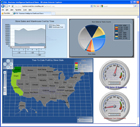Your Business, Competing on Analytics
Business analytics is the practice of monitoring and analyzing historical data from different sources and perspectives, and summarizing
the data into useful knowledge that can be used to increase revenue, cut
costs, or both. The most forward thinking companies leverage their CRM and transactional
data to compete on business analytics in ways that are incredibly compelling.
Successful data mining and business analytics solutions have shown to substantially improve
a company's awareness of opportunities to drive sales and reduce cost. Justifying a business analytics project however can be
challenging because often times the results cannot be anticipated, in the same way you could expect ROI from a line-of-business
application investment. After all, business analytics wouldn’t be needed in the first place if we already knew what the results are!
While most business analytics solutions share a similar approach, tools and methods, each business analytics initiative has its
own requirements and challenges that are unique to a particular set of data, and
unique to specific business needs.
Popular Business and Monitoring Analytics Applications
|
Sales & Marketing Analytics (CRM) |
Sales Analytics is the prototypical case of applying monitoring analytics solutions to address practical business needs.
It is easy to recognize Sales Analytics being used by Amazon.com, eBay and other companies to 'predict' which products you
might like to purchase, based on the products you are currently viewing.
An analytic algorithm can be devised to indicate similar products that other customers have purchased
and are therefore more likely to sell in combination. Showing combinations of products that have been purchased together is
likely to increase sales and customer satisfaction. Another example of Sales Analytics is customer segmentation and classification
to target specific advertising or promotions.
|
|
Predictive Analytics
|
Predictive Analytics is used to analyze risk, forecast events, and monitor other conventional
types of business analytics. Predictive analytics encompasses a variety of
techniques from statistics and data mining that analyze current and historical data,
in an attempt to predict future events by identifying patterns and trends in the data.
For example, for investment managers, predictive models can exploit
patterns in historical and transactional data to identify potential risks
and investment opportunities. Predictive Models can capture relationships among many factors to allow
assessment of risk or potential associated with a particular set of investment conditions,
guiding the purchase and sales process. Predictive analytics are also used heavily in insurance,
telecommunications, retail, travel, healthcare and pharmaceutical industries. |
|
Healthcare Analytics
|
The medical and pharmaceutical fields actively use business analytics to provide
clues as to who might get sick, and the types of diseases certain patients are susceptible to
based upon empirical (evidence-based) data on which diseases tend
to occur together, or attact a particular demographic. Healthcare
analysts use business analytics to help predict which drugs are likely to work, and to determine the
potential negative affects when used in combination.
Consultants also use Healthcare Analytics to predict influenza outbreaks, and which vaccines are likely to work best.
|
|
Financial & Insurance Analytics
|
Financial and insurance companies use business analytics extensively to detect fraud,
as well as look for new demographic trends. Insurance Analysts attempt to predict catastrophic weather patterns
so that they know to set higher premiums on high-risk areas. One of the most well-known monitoring analytics applications is credit
scores that are used to rank-order individuals by their likelihood
of making future credit payments on time. The less likely an individual is to make payments on time, the more they
are worth in terms of late fees, and hence the more money the financial institution is willing to pay to get their business! |
|
Web Analytics |
Web Analytics, including Google Analytics, Yahoo! Web Analytics and MSN Analytics, and many others,
are becoming the most pervasive uses of monitoring analytics. Perhaps you are here on our site
because of the advanced analytic techniques that PCA uses to attract the right visitors! If you are
interested in Web Analytics, Relational Database Applications, Smart Client Applications or Data Analytics,
then it’s working!
The goal of Web Analytics is to optimize web site content and meta-data
for particular keywords and topics to support both SEO (organic) and PPC (paid ads),
so that your web site will attract only the right type of visitor interested in purchasing your product or services. Effective
Web Analytics does not look to
attract the most visitors, but rather aims to attract more visitors that convert into sales for your company.
|
Practical Limitations
As your SQL database grows in size and complexity, the ability to derive meaningful business
intelligence using traditional SQL Server Reporting Services queries can become complex,
time-consuming and sometimes nearly unmanageable. This is because many valid,
business-critical questions are either: difficult to formulate in a SQL query (For example, "Find all customer records
that are similar to this customer's problem."), or, the question can be formed in a query but take
extraordinary amounts of time and processing
power to execute, and is therefore impractical.
In fact, gathering and maintaining huge amounts of data without the ability to extract
meaningful intelligence will lead you further away from a return on your investment.
BI / Analytics / DV Consulting
Test Drive a Business
Analytics Demo Application
[Click to Run]
